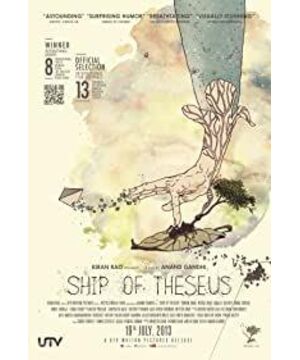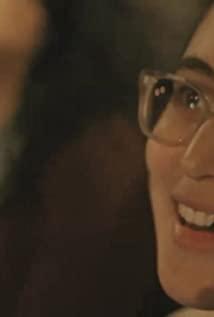I read a comment saying that the ship of Theseus was destined to be thrown into the sky for dozens of streets, so I deliberately watched it first and then watched the ship of Theseus. Intuit's high-mindedness and far-reaching ideological realm are of course stronger than that of the so-and-so society that seems to satirize the gods and amuse the ugly, but in fact set up agencies everywhere to prepare to break through the censorship and earn box office. It is destined to talk more about the violence that the social environment has created, and there is no need to endure it any longer. But what is created equal is only equal rights, and no one is obliged to ensure that everyone eats, drinks, sleeps, eats, drinks, and sleeps equally. What is the relationship between their own character and God? Intuit avoids the influence of the environment on people, and directly narrates human nature.
Theseus didn't know what, and didn't want to search. There was a case in the Buddhist family: a man went out and stayed in an empty house at night. At midnight, he met a ghost carrying a corpse, and a ghost chased after him. usurp. The former ghost replied: There is a person before, let him judge. This man thought, the two ghosts are powerful, the truth is dead, and the lie is also dead, so he answered: The former! The back ghost was annoyed, and instantly tore off the man's arm, the front ghost immediately took the dead man's arm and finished it, and the person's feet and head were replaced, and the two ghosts actually ate the replaced body and walked away. This man thought: The parents who suffered from the skin and the body are now eaten by ghosts; now the body is all the flesh of others, do I have a body or not? If there is, it is all his body; if not, why does it appear? Feeling so upset, I met a monk the next day and asked, "I don't know if it's human, right or not?" The monks said, "Since your mother's womb, you have never had me, and you don't do ghost things. The four great harmony is for your own sake..."
The first story is more in line with the discussion of whether the ship is the original ship after the repair. After being blind, use a touch pen, a voice prompt tool, and the dictation of others to create photography. At this time, it is completely dependent on hearing, and even if other people's narration is not in line with their own intentions, the pictures should be deleted. And she herself can't tell whether others appreciate her works or sympathize with her blindness, which may be the reason why she cares so much about other people's narratives. After the cornea transplant, the director tried to use this incompatibility to explain that the person before and after the replacement was not the same person, and the heroine finally successfully retrieved the inspiration to give the answer: the same person is the same person or not. . But this explanation is not easy to understand, because the eyes are just like the ears, they are just extensions of the brain, and information processing is controlled by the brain. Before there was no vision, with the aid of auditory tools, the brain can also process information excellently. After having vision, it is actually Facilitating and simplifying access to information for the brain, there's no reason why it can't be as good as it was before. This replacement is not enough to show the helplessness of the "Ship of Theseus", but fortunately, the topic is still being discussed, and as for the second story, I don't understand a bit.
According to the theme of replacement, monks should report whether their beliefs have changed after organ transplantation, whether they should respect their original intentions, and continue to complain for the animals. But the video only shows the monk's perception after the wind blows the grass - don't want to leave for the time being, call a doctor! The monks are reluctant to take medicine for rejection after organ transplantation, because the medicine carries the original sin, but the rabbit in the film is experimenting on cosmetics. If you don't know, just make up your brain or ask the Internet. The length of the video is limited, so you don't waste your ink. Audiences only need to make an analogy. I have to say that the current mainstream screenwriting is open-ended and full of imagination. If you can't understand it, it means you can't keep up with art. Going back to the film, even if the monk changed his mind after hearing the young man - the man who joked as a teacher really became his teacher - he should continue to show the attitude of the monk after recovery, not a sunny The smile is over, does it mean that he agrees with the pharmaceutical company, or is he disregarding the welfare of animals? I don't know which sect this monk is from, I don't know if he knows who will go to hell if I don't go to hell, Bodhisattvas can kill people in order to save people, and Chan Master Nanquan is willing to kill cats in order to make his disciples enlightened. The monk's life is no longer his life, he is in charge of teaching and cultivating the most important bodhicitta, and everything has priorities. If you lose your life, let's not talk about who will teach everyone, but who will you be busy for animals. To inherit, sometimes, death does not need to be bothered, the difficulty is how to live. Even if a monk is not enlightened and does not have this level of thought, even if a heretic is more reasonable than him, he even says: a monk should cut off his desires, why does he like to be sexually promiscuous. But to follow your own will, you should stay committed, but it's fine to say that your family had an epiphany at the moment of death, but it shouldn't say: I want to call my mother. Is this still a cultivator with six pure faculties, is this still a cultivator who keeps saying that the Patriarch comes and the Patriarch goes? Or a cultivator with an eternal soul? I don't know if the director is using the image of a monk to satirize the so-called religion, or whether the master in people's eyes can't escape the coercion of death, can't let go of his mother, and can't figure out his soul. Not to mention whether such a monk is qualified, and the fortress is the easiest to break through from the inside, and if you don’t follow your own beliefs, is that still called belief?
The reason why I suspect that the director means something is because the director did not follow the discussion of the Theseus ship, which makes it impossible to understand whether the monk has changed or not after the replacement. In the third story, according to the logic of replacement and the discussion between the protagonist and the elders, he should change. The change is not about money, but to help a person whose kidney has been stolen. But the donor is an explorer, and there is still some distance between an explorer and a philanthropist. If only one body donation shows that the person is kind, and his kidneys are kind, the audience has no choice but to recognize it. But the male protagonist said to his elders: I make money does not mean that I am a replacement, I still have sympathy. And after he knew that someone had stolen the kidney, he said that if the kidney was his, he would return it to him. Is this a wise move that seems like a wise man? At least the victim told him: the kidney in the black market is 30,000 yuan, I am now 60,000 to 50,000 yuan, and I still have money every month, so let's stop there! A kidney can survive. Although some functions are affected, there are still donations among relatives, not to mention a good price. The male protagonist is so self-righteous that it is difficult for her elders to say to him: You don’t know where you are Sympathy for others. In this way, his kidney was replaced in vain, and he did not change at all.
From this inference, the monks have not changed, the photographer's change has only improved her creative approach, and the essence has not changed. From this, the director may have given the answer, whether the ship is replaced or not, the ship is unchanged. This may be the director's interpretation. Perhaps, it is a good movie if you can justify it. You don't want to be destined by God. Except for the ambiguity expressed in the second story, the other two stories are acceptable, but the most important thing in the world is change, and the only thing that is strong and unchangeable is human nature. The film only talks about the constant change of attributes, not why it is difficult to change, which is obviously unsatisfactory, especially the setting of the second story, which is completely satirical, which greatly reduces the favorability of watching the film. The tortuous answer in a story gives the previous story, and even gives back the gist of the whole article, which is still powerful.
View more about Ship of Theseus reviews










